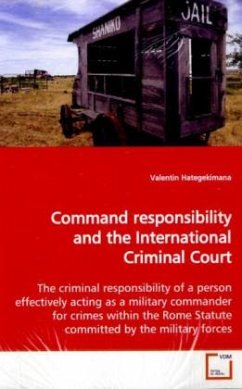This book discusses the issues surrounding the
responsibility of commanders and other superiors
under article 28(a) of the Rome Statute, but focuses
on the superior responsibility of a person
effectively acting as a military commander for crimes
committed by the military forces. Is it fair under
the Rome Statute to treat as equal a military
commander and a person effectively acting as a
military commander if he or she fails to exercise
proper control over the military forces under his or
her command and control, or effective authority and
control? Might article 28 of the Rome Statute overlap
with article 25 on individual criminal
responsibility? Does the crime of omission under
article 28 constitute a separate offence or
dereliction of duty? The author argues that it is
unfair to treat as equal the superior responsibility
of a military commander and of a person effectively
acting as a military commander for crimes committed
by the military forces. The reason is that they do
not have the same power over such forces. The nature
of command responsibility is still open to debate in
international criminal law to establish of what
exactly a superior is held responsible.
responsibility of commanders and other superiors
under article 28(a) of the Rome Statute, but focuses
on the superior responsibility of a person
effectively acting as a military commander for crimes
committed by the military forces. Is it fair under
the Rome Statute to treat as equal a military
commander and a person effectively acting as a
military commander if he or she fails to exercise
proper control over the military forces under his or
her command and control, or effective authority and
control? Might article 28 of the Rome Statute overlap
with article 25 on individual criminal
responsibility? Does the crime of omission under
article 28 constitute a separate offence or
dereliction of duty? The author argues that it is
unfair to treat as equal the superior responsibility
of a military commander and of a person effectively
acting as a military commander for crimes committed
by the military forces. The reason is that they do
not have the same power over such forces. The nature
of command responsibility is still open to debate in
international criminal law to establish of what
exactly a superior is held responsible.








